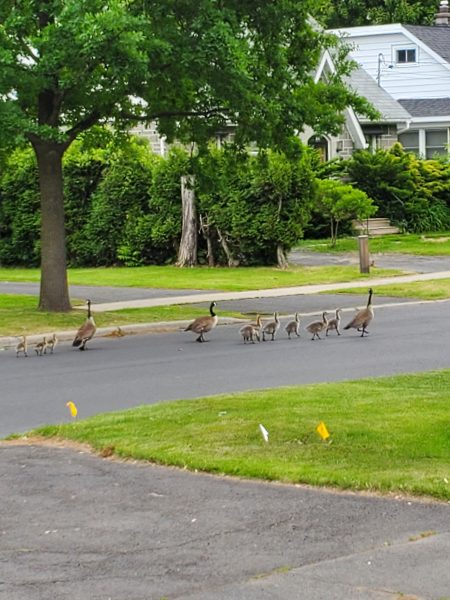In the spring and summer, it’s not uncommon to see flocks of geese crossing roads with their goslings trailing along behind. But with many areas around Ontario becoming more developed, it can be difficult for geese to have enough space to nest and safely make it across the road. In Cornwall, Ontario, the Ontario SPCA and Humane Society and local residents have come together to help ensure the safety of geese in its high traffic areas.
Cornwall is located on the St. Lawrence River, and one of its the busiest streets leads the U.S. border. In the past, geese often nested in marshland areas along this street. Now that the area has become more developed, some geese have begun nesting in parking lots, and other high traffic areas close to the water.
Bonnie Bishop, Associate Director Animal Protection Services with the Ontario SPCA and Humane Society, is also a Cornwall resident and has witnessed geese crossing several busy streets with their young.
“When the babies are young and flightless, it’s common to see the families crossing from their nesting to their feeding area, and people are concerned,” says Bishop. “The geese are a protected species, and it’s a public safety issue as well as an animal well-being issue. Every year some of the geese are hit and killed crossing the road.”
Concerned citizens motivate change
 When concerned citizens came forward to see what could be done about the problem, Bishop reached out to the City of Cornwall to ask if geese crossing signs could be put up.
When concerned citizens came forward to see what could be done about the problem, Bishop reached out to the City of Cornwall to ask if geese crossing signs could be put up.
Within a week, Bishop received an email back confirming the geese crossing signs had been ordered, received and were being put up in identified high geese crossing areas. “We want to commend the City of Cornwall on how quickly they acted on this concern, and the concerns of the community, to ensure the safety of these animals,” she says.
The seasonal signs create awareness of the geese and encourage people to be on the look out so they can slow down and react in a safe manner.
“I think everyone has an opportunity to make change and to help animals in their community,” says Bishop. “I encourage everyone to be aware of the animals in your community and do what you can to protect and assist them whenever possible.”
If you have a wildlife concern that requires immediate help, please contact your local wildlife centre.
For more tips on living harmoniously with wildlife, check out more stories on our blog.

